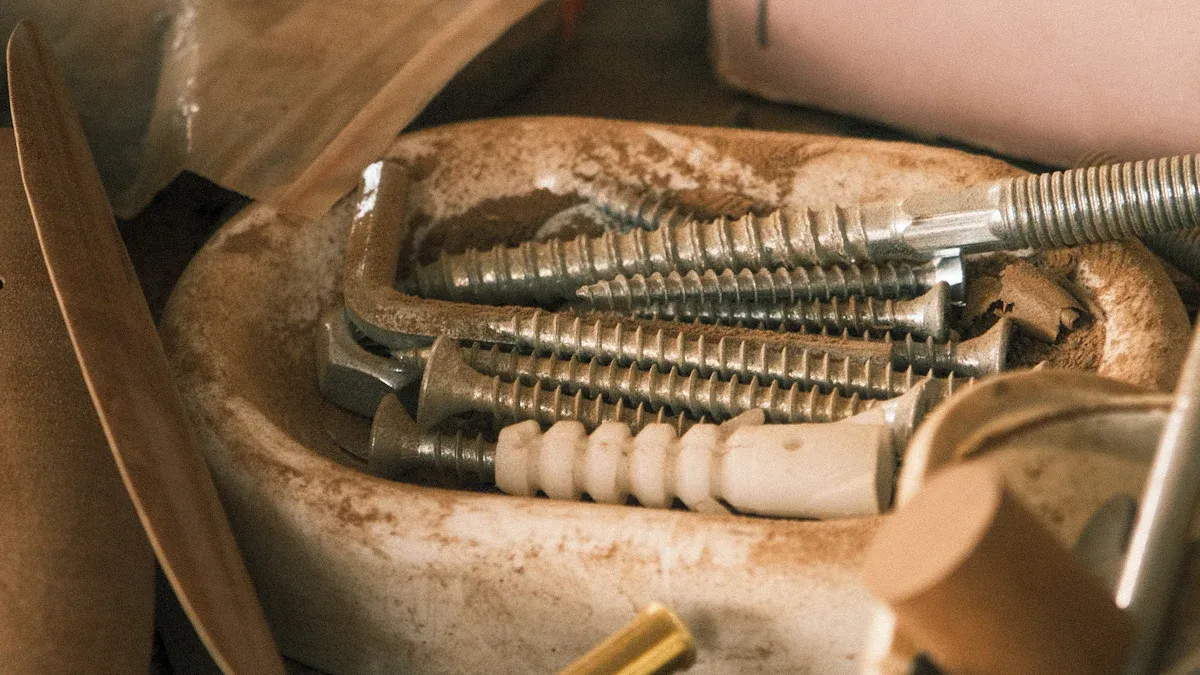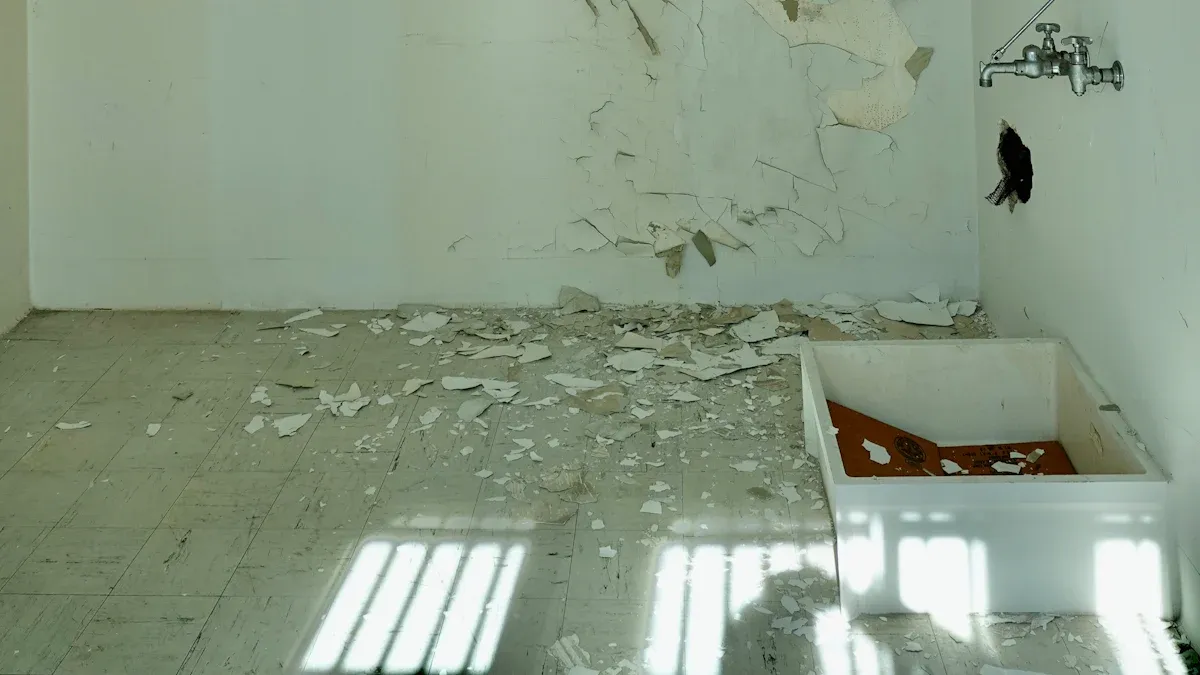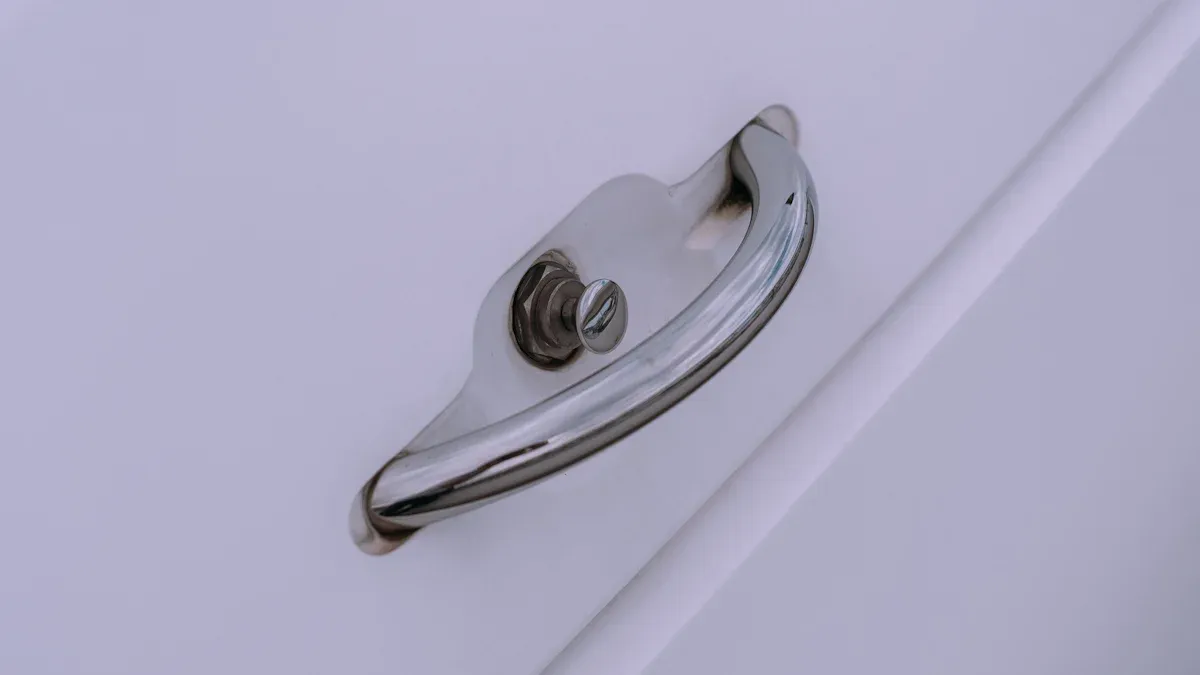
 FEEDBACK
FEEDBACK
If you are interested in our products and want to know more details, please leave a message here, we will reply you as soon as possible.


You might notice your bathroom cabinet looks moldy or just feels hard to clean. Maybe you struggle with lack of counter space, unattractive designs, or awkward cabinet depth. Bathroom Cabinet Problems like these pop up all the time, but you can fix them with a little know-how and the right approach.

Sometimes you see a scratch or chip on your bathroom cabinet. You might wonder how it happened. These marks are not as common in bathrooms as in kitchens. Bathrooms do not get used as roughly. You may only find small marks from daily use.
How to Fix:
Wipe the spot with a damp cloth and let it dry.
Use wood filler or a touch-up marker that matches the cabinet color.
Sand the area gently after the filler dries.
Clean away dust and put on a matching finish or sealant.
Tip: Keep a repair kit nearby for quick fixes. This helps you fix small Bathroom Cabinet Problems before they get worse.
Prevention:
Put soft bumpers on doors and drawers. Do not slam cabinet doors. Check inside often for loose items that could scratch the surface.
A peeling finish can make cabinets look old and messy. This problem happens because of:
Sudden temperature changes
Low-quality cabinet materials or finishes
Using strong cleaning products
How to Fix:
Sand the peeling spot lightly to remove loose finish.
Wipe away dust with a damp cloth.
Put on a coat of Rethunk Junk paint or another protective finish.
Let it dry all the way before using the cabinet again.
Note: Always use gentle cleaners and a soft cloth to protect the finish.
Prevention:
Keep your bathroom aired out. Use mild cleaners. Pick cabinets with good finishes to avoid future Bathroom Cabinet Problems.
Water damage is one of the hardest Bathroom Cabinet Problems. Leaks, splashes, and high humidity can cause swelling, stains, or mold.
How to Fix:
Dry the spot right away with a towel.
Take out anything inside the cabinet.
Use a fan or dehumidifier to help it dry faster.
If the wood is bent or soft, you may need to replace that part.
Best Practices for Prevention:
Best Practice | Description |
|---|---|
Proper Installation | Install cabinets with small gaps to keep water out. |
Improve Ventilation | Use an exhaust fan or open a window to lower humidity. |
Smart Materials | Pick water-resistant materials like treated wood or special varnishes. |
Daily Maintenance | |
Periodic Checks | Look for leaks and tighten plumbing fixtures often. |
Tip: Put absorbent mats inside base cabinets and leave under-sink doors open sometimes to let air move.
Mold and mildew grow fast in bathrooms. Cabinets can get moldy if the room is damp or not aired out well.
Mold and mildew spread quickly because of moisture from showers and baths. If you see black or green spots, clean them right away.
How to Fix:
Product Name | Active Ingredient | Application Method | Price |
|---|---|---|---|
Bleach | Spray | $13 | |
RMR Brands RMR-141 Disinfectant | Bleach | Spray | $18 |
CLR Mold & Mildew Stain Remover | Alcohols, potassium bicarbonate | Spray | $12 |
Mold Armor Mold Blocker | N/A | Spray | $10 |
Aunt Fannie’s All-Purpose Cleaning Vinegar | Vinegar | Spray | $12 |
Spray the spot with your chosen cleaner.
Wait for the time listed on the bottle.
Wipe the area with a clean cloth.
Repeat if you need to.
Note: Always wear gloves and keep the bathroom aired out when cleaning mold.
Prevention:
Run the exhaust fan during and after showers. Wipe cabinets often. Check for leaks and fix them quickly to avoid more Bathroom Cabinet Problems.
Swollen cabinet doors can be hard to open and close. This happens when wood gets wet or when the bathroom changes temperature a lot.
Temperature changes make wood expand and shrink.
Poor ventilation makes swelling worse.
How to Fix:
Take off the door and let it dry fully.
If it is made of particle board, put Aquadhere PVA glue on the swollen spot.
Use clamps with wood pieces on both sides to press the door back into shape.
You may not get the door to look new, but you can make it better.
Tip: If the swelling is very bad, you may need to replace the door.
Prevention:
Keep your bathroom dry and aired out. Wipe up water spills quickly. Pick cabinets made from moisture-resistant materials to stop swelling.

You might notice your cabinet doors look crooked or don’t close right. This happens for a few reasons:
Reason | Description |
|---|---|
The weight of the door can loosen screws over time. | |
Worn Hardware | Old or worn parts can mess up the alignment. |
Environmental Factors | Humidity and temperature changes can shift the doors. |
You can fix this yourself.
Open the cabinet and find the hinges.
Loosen the two vertical screws to adjust the height.
Use the side screw to move the door left or right.
Adjust the depth by turning the back screw.
Tighten all screws when you finish.
If the door still won’t align, you may need new hardware or help from a pro.
Broken hinges make doors sag or fall off. Here’s how you can replace them:
Grab a screwdriver, new hinges, wood filler, and a drill.
Remove the old hinge by unscrewing it.
Fill any stripped holes with wood filler and let it dry.
Sand the area smooth.
Attach the new hinge, mark the holes, and screw it in.
Adjust the hinge so the door moves smoothly.
If the wood is badly damaged, call a professional for help.
Sticky drawers are a common Bathroom Cabinet Problems.
Most drawers stick because the wood swells from humidity or moisture.
To fix this:
Remove the drawer.
Clean the slides with a damp cloth.
Use paraffin wax for wood slides or white lithium grease for metal ones.
Reinsert the drawer and test it.
Broken slides make drawers noisy or hard to open. Signs include:
Loud noises
Bent rails
Drawers that don’t sit flush
Uneven or jerky movement
If cleaning and lubricating don’t help, replace the slides. If the drawer still won’t work, you may need a professional.
Do you feel like your bathroom cabinet never has enough space? You can fix this with a few smart tricks.
Organize your items by type and use labels for quick access.
Use vertical space by adding extra shelves or expandable organizers.
Try spinning turntables or rolling carts for easy reach.
Declutter your cabinet every few months to keep it neat.
You can also use drawer organizers and trays for small items. If you want more space, install a medicine cabinet or mount racks on the back of the door. These ideas help you solve Bathroom Cabinet Problems and make your morning routine smoother.
Old knobs and pulls can make your cabinet look tired. They can also cause frustration if they stick or squeak.
Outdated hardware can break the look of your bathroom and make it feel unfinished.
Worn-out handles or hinges can make cabinets hard to use.
New hardware makes cabinets easier to open and gives your bathroom a fresh style.
Check out some popular hardware trends:
Trend | Description |
|---|---|
Matte Black Everything | Bold and modern, adds contrast. |
Brushed Brass and Gold | Warm and classic, pairs well with wood. |
Mixed Metals | Lets you mix finishes for a unique look. |
Smart Technology | Adds features like soft-close or touchless opening. |
Minimalism and Sleek Designs | Clean lines for a calm, uncluttered space. |
Tip: Swapping out hardware is quick and budget-friendly. You can do it in an afternoon!
You don’t need a big budget to give your bathroom cabinets a new look. Try these easy updates:
Replace old hardware with something trendy.
Add a new countertop or paint the old one.
Update your faucet to match your new style.
Add mirrors or new lighting for extra flair.
Many people now choose floating vanities or furniture-style cabinets for a modern touch. Storage-focused cabinets are also popular, especially in small bathrooms. You can pick colors like white, gray, or natural wood, or go bold with an accent color. Personalize your cabinets to fit your style and needs. Your bathroom will feel brand new!
Most bathroom cabinet problems are easy to fix with basic tools. You just need to try and put in some effort. Doing regular checks helps your cabinets stay nice. If you see big damage, try these ideas:
Call a professional if the repair is too hard for you.
Always measure well and do not rush, so you do not make expensive mistakes.
You can do it—your bathroom can look awesome!
You should check your cabinets every month. Look for water damage, loose hardware, or mold. Quick checks help you catch issues early.
You can fix small water spots by drying and cleaning the area. If the wood feels soft or warped, you may need to replace that part.
You need a screwdriver, wood filler, sandpaper, and a touch-up marker. These tools help you fix scratches, tighten hardware, and keep cabinets looking fresh.